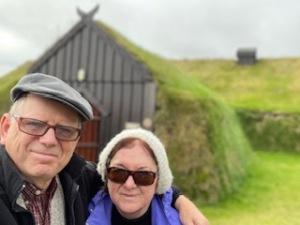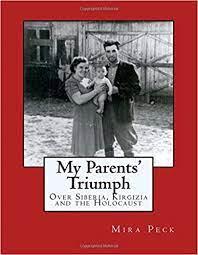
I remember the Pecks’ first time at a local humanist gathering. Very ordinary looking dull folks, I thought. I remember that because deeper acquaintance has revealed remarkableness.
Dave was a teacher. Mira had both chemical engineering and law degrees, and a high powered corporate career. They adopted Russian orphans. Their world travels have been impossibly adventurous.
Mira also authored some novels, but I didn’t think much about that until getting to know her better. When I expressed interest, she handed me three books.

One, nonfiction, My Parents’ Triumph, chronicles their story, based on Mira’s intensive recorded interviews. Her father, Wolf, was born Jewish in Poland in 1921. So you can imagine.
But he did not follow a familiar trajectory. Wolf was a real operator (like my German Jewish grandfather). He escaped Poland during WWII and bopped around Eastern Europe, living by his wits. Which were apparently considerable. He married a non-Jewish woman whose own story was topsy-turvy, including a Siberian stint. Mira was born in 1946 in what is now Kyrgyzstan, then part of the USSR. The cover photo shows the parents holding the baby, with a starkly grim backdrop scene. It’s jarring to connect that baby with the modern woman I know.
Wolf returned to Poland, thriving under the Communist regime, soon in charge of an industrial enterprise employing hundreds. Then the political wheels turned, and they had to leave. Emigrated to Australia.
Funny thing: At one time I had this weird similar picture, of my wife and I, refugees (like my mother was), singing “Waltzing Matilda” as we deplane. And that was back when we still thought “it can’t happen here.” (“O Canada” might actually be likelier.)
Having to start all over in Australia was tough for Wolf. More so for 16-year-old Mira, who hated the relocation, leaving behind a life in which she felt herself thriving. Eventually she met and married Dave, an America on an Australian teaching gig; and so she wound up in the U.S.

Segue to the novels — My Men, and My Men Too. They’re first person narratives by “Alina,” Polish born, emigrated to Australia at 16, chronicling her career — nontraditional for a woman, illustrating the battle against sexism — and her marriage to “Wayne.” It’s said all fiction is ultimately autobiographical. But some novels are more autobiographical than others.
This duology is not Eat, Pray, Love — Mira (and Alina) are resolutely atheist — but in addition to love, there is a lot of eating. Not that the books focus on it. But numerous meals are carefully described, often making me salivate.

The marriage is at the heart of the story. Even before tying the knot, Wayne tells Alina he believes in “open marriage.” She’s not comfortable with that, but they’re in love, so she squashes down her misgivings. Still they gnaw at her. She’s a liberated modern secular woman, yet harboring a conventional idea of marriage fidelity. Wayne keeps insisting the whole thing is “no big deal;” sleeping with others wouldn’t betray the marriage if it’s done openly and honestly. Marriage shouldn’t be a prison; partners should be free to do what feels good.
It all actually seems theoretical. Though Wayne’s attentions to other females discombobulate Alina, he apparently has never actually done anything. Yet when, conversing with a friend, Alina calls Wayne her rock, she finds the reply apt: “a slippery rock.”
In fact it’s Alina who falls for a charming co-worker. She arranges a weekend with him — clearing it first with Wayne. When she returns, he inquires how it went. She talks of museums and restaurants.
“And did you make love?” Wayne asks nonchalantly.
“No,” she answers. In the end, she couldn’t go through with it.
Nor does she, with later opportunities — even after leaving Wayne. There were other issues, but his “open marriage” ideology, even if only theoretical, ravaged her peace of mind.
Spoiler: they get back together and seem to resolve matters.

So — what about this “open marriage” idea? The essence of marriage is love and mutual support. The “love” part does include carnal love, it’s important, but even the horniest couples actually spend only a small fraction of their time in bed. Yet our sexual drives are so strong that we nevertheless fetishize and sacralize the sex act. And our evolution-based genetics plays a big role. All nature wants from us is reproduction; more specifically, producing offspring who will themselves reproduce. That’s advanced by a father sticking around in raising the kid. But he wants to know the kid is really his — no point in raising one with someone else’s genes. And the mother wants exclusivity as well, so the guy won’t be distracted with other offspring. This is why we are evolutionarily programmed to be sticklers for sexual fidelity.
But we human beings are not condemned to mindlessly play out what our genes tell us — we rational creatures can countermand them if that better suits our own (rather than nature’s impersonal) purposes.
I think the fidelity (faithfulness) that really matters in marriage equates to the mutual support I mentioned. It means standing by each other; sticking up for each other; helping each other to live the best lives possible. Way more important than doings below the belt.
